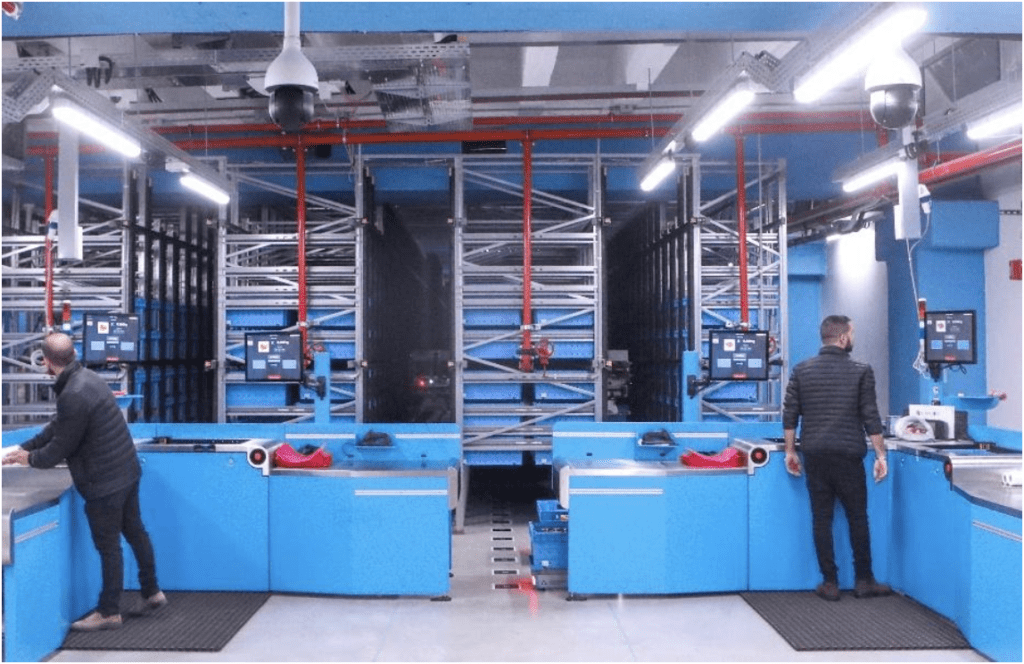Located in the heart of Tel Aviv, this micro-fulfillment center enables retail partner Rami Levy to enter a new market while answering the growing consumer demand for on-demand grocery delivery
TEL AVIV, ISRAEL, December 18th 2019 — Fabric, formerly CommonSense Robotics, today announced that its automated grocery site is live and delivering online orders to customers in the heart of Tel Aviv, Israel. Built underground in a triangular space with low ceilings, the new micro-fulfillment center is a display of the company’s ability to build a site to any parameter, a feat made possible by Fabric’s proprietary robotic and software technology stack.
Micro-fulfillment is quickly gaining traction as the preferred fulfillment paradigm for the new era of retail. A new report from Jefferies posits that “micro-fulfillment is superior to all fulfillment models”; compared to centralized automated fulfillment, manual picking, or third party manual picking, micro-fulfillment is the most profitable platform for online grocery fulfillment. The Wall Street Journal writes that “demand for smaller warehouses is soaring as e-commerce and the push for faster delivery accelerates competition for industrial space close to major population centers”; CBRE reports that “demand for well-located, small light-industrial properties…continues to outpace that for larger warehouses, largely driven by local economic activity, urban population growth, and same-day delivery expectations of consumers.”
While the need for micro-fulfillment is clear for profitable online grocery fulfillment, grocery retailers are demanding flexibility from their automation partners in light of the uncertainties of the evolving e-commerce landscape. Pressed by the need to move swiftly yet facing uncertain horizons, retailers are demanding solutions that are not limiting or restricting. Unlike other micro-fulfillment solutions, Fabric’s proprietary solution can meet these needs for flexibility. The platform has no fixed volume, height or size, can add more capacity as the retailer’s needs change even once the site is operational, and can be built inside a retailer’s existing store, adjacent to it, or even in the most unconventional of spaces such as an underground parking garage.

“It has become clear to retailers that they need automation close to their customers in order to be profitable, but there is now a new demand for flexibility,” said Steve Hornyak, Fabric’s Chief Commercial Officer. “Retailers face uncertainty every direction they look with the rapid onset of e-commerce, and they need a partner and solution that is able to meet their needs today while changing dynamically as their needs evolve tomorrow. That’s not a simple feat for an automation solution, and no other solution on the market provides the kind of technological and operational flexibility that we do. Whether a retailer wants to support 300 orders or 1,000, with a height of 12 feet or 30 feet, in a real estate site with a footprint of a rectangle or triangle, we can do it all, whereas other solutions are restricted by conveyor belts and rigid design requirements. Our solution is here to serve retailers’ needs whatever they are and wherever they will be.”
Fabric’s new micro-fulfillment center is specially designed to make on-demand grocery deliveries a reality. Operating from beneath a skyscraper in Tel Aviv’s busiest neighborhood, Shalom Meir Tower, the site serves the online customers of one of Israel’s largest grocery retailers, Rami Levy. In a feat of engineering and structural design, it fits the full power of automation into an 18,000 square foot triangular space with an average height of only 11 feet. It is a full-service grocery site with three temperature zones, fulfilling fresh, ambient, chilled, and frozen items, and will be fulfilling hundreds of orders a day.
By leveraging underutilized real estate in the heart of the city, the warehouse is strategically located in close proximity to end-consumers, enabling it to serve one-hour and same-day deliveries both profitably and at scale. The new micro-fulfillment center also enables Fabric’s retail partner Rami Levy to penetrate a new part of the city that it currently doesn’t serve through its brick-and-mortar stores.
The launch of this new automated grocery site comes on the heels of Fabric’s recent $110 million Series B funding announcement, which it will use to fuel its expansion into the United States.
About Fabric
Fabric is a logistics platform that makes on-demand fulfillment possible, profitable, and sustainable for retailers while powering every retailer’s unique offering. The company builds multi-tenant and private networks of automated micro-fulfillment centers that make on-demand fulfillment profitable by locating automation physically close to end customers.
Unlike any other micro-fulfillment solution, Fabric’s unique purpose-built proprietary solution enables cloud-like elasticity for retailers, enabling them total flexibility to build a custom solution based on their unique inventory level, desired reach, and opex and capex requirements, expanding and flexing as their needs change.
The company’s solution has been deployed commercially since 2018 and is production-proven. With offices in Tel Aviv and New York, Fabric is rapidly expanding its U.S. operations. Founded in 2015, Fabric has raised $136 million to date and is backed by Aleph, Corner Ventures, Canada Pension Plan (CPP), Innovation Endeavors, La Maison, Playground Ventures, and Temasek.

